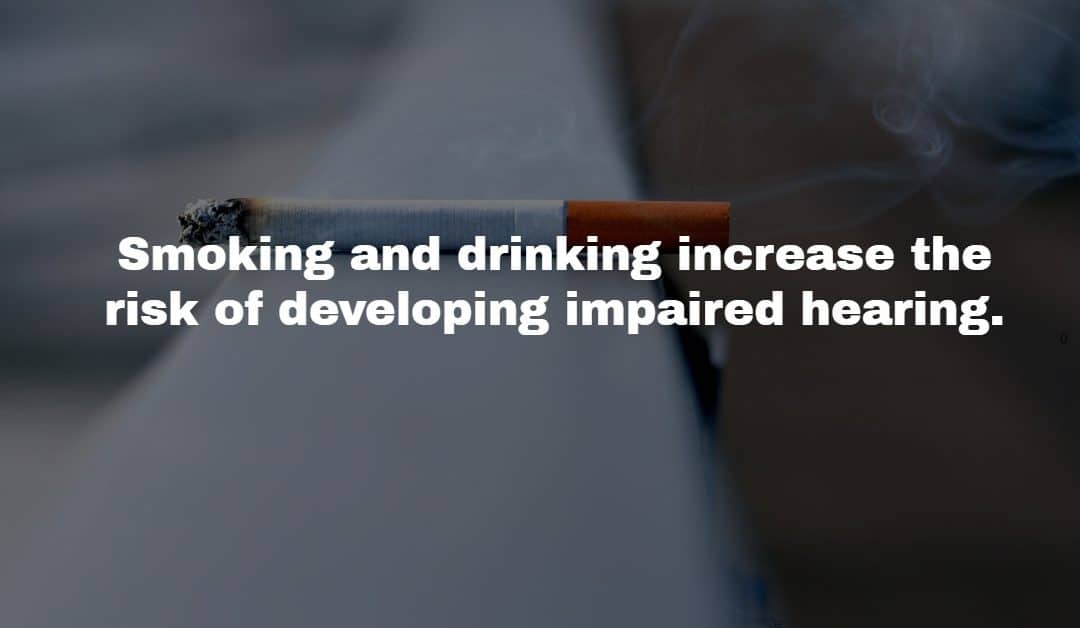We are all aware of the common health risks of smoking and drinking: lung cancer, heart disease, high blood pressure, liver disease etc. Less known is the link between smoking, drinking, and hearing loss. Smoking and drinking increase the risk of developing various medical conditions including impaired hearing. Studies have shown the adverse impact of these specific substances on hearing health yet their consumption remains common activities. It is critical to be aware of the relationship between smoking, drinking, and hearing loss as well as ways to protect your hearing!
The Research
There are numerous studies and research findings that reveal the association between smoking and drinking with increased risk of hearing loss. A few examples of some of the latest research includes:
1. In a 2018 study published by Oxford University Press, researchers in Japan found smokers are more likely to develop hearing loss than nonsmokers. The study included 50,000 Japanese workers, ages 20 to 64 who did not have hearing loss in the beginning. These participants were also a mix of smokers, nonsmokers, and former smokers. Over the course of 8 years, more than 5,100 of the participants developed hearing loss. After examining data from annual health screenings, yearly hearing tests, and questionnaires that assessed smoking behavior, researchers found that compared to the nonsmokers, people who smoked were:
– 60% more likely to develop high frequency hearing loss
– 20% more likely to develop low frequency hearing loss
Also investigating the amount of smoking, researchers found that:
- The higher the number of cigarettes smoked per day, the greater the risk of hearing loss
- Quitting smoking eliminated the increased risk of developing hearing loss
2. In a 2019 study published in the Journal of Audiology & Otology, researchers in South Korea investigated the link between hearing loss and consumption of alcohol. The study involved analyzing data from the Korean National Health and Nutritional Survey for 3,860 participants, ages 20 and older. The survey included results from hearing tests and a self-reported drinking questionnaire that identified drinking habits as appropriate, risky, and hazardous. Findings from the analysis included:
- Men who reported hazardous drinking were 2.5 times more likely to have hearing loss compared to those who reported appropriate drinking
- Researchers concluded that people (specifically men) who drank excessively were more likely to suffer from impaired hearing.
- Extensive research supports the claim that smoking and drinking increase the risk of hearing loss.
But how exactly can smoking and drinking affect hearing?
Impact of Smoking & Drinking on Hearing
The sense of hearing involves a complex process of absorbing, amplifying, and processing sound. We do this through the auditory system which requires healthy blood flow, blood vessels, cells, and bones located throughout our ears. These components of healthy hearing can be harmed by the specific ingredients in cigarettes and alcohol.
– Smoking: key ingredients in cigarettes are nicotine and carbon monoxide. These chemicals have several effects that can cause hearing loss including:
- Reducing oxygen levels and constricting blood vessels all throughout the body, including in the inner ear which help maintain the health of hair cells.
- Disrupts the neurotransmitters in the nerve pathways located in the inner ear which are responsible for sending sound information to your brain to process
- Contribute to tinnitus which is a ringing or buzzing sound in one or both ears
– Drinking:
- Alcohol can damage the auditory cortex which is the part of the brain that is responsible for processing and making meaning of the sound we hear. Significant consumption of alcohol can shrink the auditory cortex, reducing its ability to effectively function.
- Disrupts the inner ear which consists of thousands of hair cells that help translate soundwaves into electrical signals sent to the brain to process. Excessive drinking can damage these hair cells which do not regenerate, meaning that damage is permanent.
Preventative Tips
There are ways that you can reduce your risk of developing hearing loss. This includes:
– Eliminate or limit smoking and drinking: reduced consumption does also reduce your risk.
– Have hearing assessed: if you are a smoker and/or drinking, it is important to have your hearing evaluated. This will let you know if you have any impairment, the degree, and type of hearing loss.
Fortunately, there are effective treatment options that can significantly increase your ability to hear! To learn more, contact us today.

